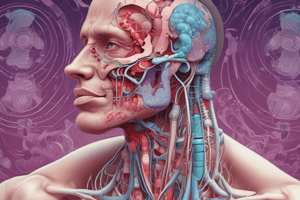Podcast
Questions and Answers
What is the most common cause of hyperthyroidism?
What is the most common cause of hyperthyroidism?
- Toxic multinodular goiter
- Taking too much thyroid hormone medication
- Graves' disease (correct)
- Thyroiditis
Which of the following is a common symptom of hyperthyroidism?
Which of the following is a common symptom of hyperthyroidism?
- Fever
- Joint pain
- Weight loss (correct)
- Numbness in hands
Which test is used to measure the amount of iodine taken up by the thyroid gland?
Which test is used to measure the amount of iodine taken up by the thyroid gland?
- CT scan
- Radioactive iodine uptake test (correct)
- Blood test
- Ultrasound
What is the purpose of thionamides in the treatment of hyperthyroidism?
What is the purpose of thionamides in the treatment of hyperthyroidism?
What is a potential complication of untreated hyperthyroidism?
What is a potential complication of untreated hyperthyroidism?
Which of the following is a lifestyle change that can help manage hyperthyroidism?
Which of the following is a lifestyle change that can help manage hyperthyroidism?
What is thyroid storm?
What is thyroid storm?
Study Notes
Definition and Causes
- Hyperthyroidism is a condition in which the thyroid gland produces too much thyroxine (T4) and triiodothyronine (T3), leading to an overactive thyroid gland.
- Causes:
- Graves' disease (most common cause): an autoimmune disorder that causes the thyroid gland to produce excessive amounts of thyroid hormones.
- Toxic multinodular goiter: a condition in which one or more nodules on the thyroid gland produce excessive amounts of thyroid hormones.
- Thyroiditis: inflammation of the thyroid gland that leads to the release of stored thyroid hormones.
- Taking too much thyroid hormone medication.
Symptoms
- Common symptoms:
- Weight loss
- Rapid heartbeat
- Nervousness or anxiety
- Hand tremors
- Enlarged thyroid gland (goiter)
- Heat intolerance
- Fatigue
- Hair loss
- Changes in menstrual cycle
- Less common symptoms:
- Red, swollen skin on the shins and feet
- Bulging eyes (in Graves' disease)
Diagnosis
- Blood tests:
- Measure levels of T4 and T3
- Measure levels of thyroid-stimulating hormone (TSH)
- Imaging tests:
- Ultrasound: to examine the thyroid gland for nodules or enlargement
- Radioactive iodine uptake test: to measure the amount of iodine taken up by the thyroid gland
Treatment
- Medications:
- Thionamides: to reduce the production of thyroid hormones
- Beta blockers: to reduce symptoms such as rapid heartbeat
- Radioactive iodine therapy: to destroy part of the thyroid gland and reduce hormone production
- Surgery: to remove part or all of the thyroid gland
- Lifestyle changes:
- Avoiding iodine-rich foods
- Getting regular exercise
- Managing stress
Complications
- Heart problems:
- Atrial fibrillation
- Congestive heart failure
- Osteoporosis
- Thyroid storm: a life-threatening condition that occurs when the body is exposed to high levels of thyroid hormones
- Vision problems: double vision, blurred vision, and eye inflammation (in Graves' disease)
Definition and Causes
- Hyperthyroidism is a condition where the thyroid gland produces excessive amounts of thyroxine (T4) and triiodothyronine (T3).
- Causes of hyperthyroidism include:
- Graves' disease (most common cause) - an autoimmune disorder that leads to excessive thyroid hormone production.
- Toxic multinodular goiter - a condition where one or more nodules on the thyroid gland produce excessive thyroid hormones.
- Thyroiditis - inflammation of the thyroid gland that releases stored thyroid hormones.
- Taking too much thyroid hormone medication.
Symptoms
- Common symptoms of hyperthyroidism:
- Weight loss
- Rapid heartbeat
- Nervousness or anxiety
- Hand tremors
- Enlarged thyroid gland (goiter)
- Heat intolerance
- Fatigue
- Hair loss
- Changes in menstrual cycle
- Less common symptoms:
- Red, swollen skin on the shins and feet
- Bulging eyes (in Graves' disease)
Diagnosis
- Diagnostic tests for hyperthyroidism:
- Blood tests to measure levels of T4, T3, and TSH (thyroid-stimulating hormone)
- Imaging tests:
- Ultrasound to examine the thyroid gland for nodules or enlargement
- Radioactive iodine uptake test to measure iodine uptake by the thyroid gland
Treatment
- Treatment options for hyperthyroidism:
- Medications:
- Thionamides to reduce thyroid hormone production
- Beta blockers to reduce symptoms like rapid heartbeat
- Radioactive iodine therapy to destroy part of the thyroid gland and reduce hormone production
- Surgery to remove part or all of the thyroid gland
- Lifestyle changes:
- Avoiding iodine-rich foods
- Regular exercise
- Managing stress
Complications
- Potential complications of hyperthyroidism:
- Heart problems:
- Atrial fibrillation
- Congestive heart failure
- Osteoporosis
- Thyroid storm - a life-threatening condition caused by high levels of thyroid hormones
- Vision problems:
- Double vision
- Blurred vision
- Eye inflammation (in Graves' disease)
Studying That Suits You
Use AI to generate personalized quizzes and flashcards to suit your learning preferences.
Description
Learn about the definition and causes of hyperthyroidism, including Graves' disease, toxic multinodular goiter, and thyroiditis. Test your knowledge of this endocrine disorder.



